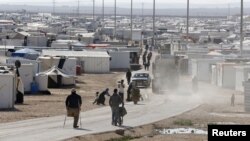The U.N. refugee agency reports conflicts forced a staggering 5.5 million people to flee their homes during the first six months of 2014. In its new report, the UNHCR says these newly uprooted people added to the record 51.2 million people who were forcibly displaced worldwide by the end of 2013.
At this rate, the U.N. refugee agency fears another record of people forcibly displaced may be set by the end of this year.
The new trends show from January through June of last year, 1.4 million people fled across international borders becoming refugees. The rest, more than four million people, became displaced within their own countries.
UNHCR spokesman Adrian Edwards told VOA that Syrians, for the first time, have become the largest refugee population, bumping Afghans, who have held that position for more than three decades.
“Syria has really been the war that has changed everything. Almost 10 million refugees and internally displaced people as of mid-2014. Those numbers are still rising. One in every four refugees that UNHCR is today dealing with is a Syrian. Syria is what happens when a war will not be stopped and in that region around Syria where so many refugees are, we are, meanwhile, seeing that asylum is becoming massively stretched,” said Edwards.
The report said the world is beset with a deadly mix of both new and old conflicts. Relatively new conflicts in places such as Syria, the Central African Republic, and South Sudan are going on at the same time that old conflicts continue to cause havoc for their nationals with no end in sight.
The UNHCR notes the 2.7 million Afghan refugees worldwide remain the largest protracted refugee population under its care. After Syria and Afghanistan, the leading countries of origin for refugees under UNHCR care are Somalia, Sudan, South Sudan, the Democratic Republic of Congo, Burma, and Iraq.
Edwards said poor countries and those next to ongoing conflicts bear the biggest refugee burden.
“Relative to their population sizes, Jordan and Lebanon are hosting most refugees - almost 1.8 million combined. The biggest economic burden though is being felt by other countries - that is Ethiopia and Pakistan, in particular, which relative to their [economies’] size… have more refugees than in any other country. Major conflicts and displacement in places such as Central African Republic, South Sudan is also happening. That is in danger of being forgotten by public and by donors,” said Edwards.
Edwards notes that African conflicts are not confined to their countries alone. He said the humanitarian and economic consequences for their impoverished neighbors are enormous.
He said these countries, though they are least able to afford it, are sheltering hundreds of thousands of refugees, often without adequate support from wealthy donor governments.




